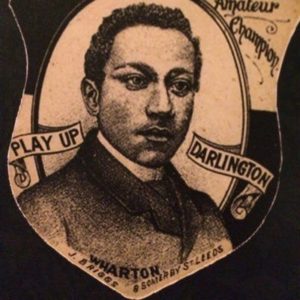Arthur Wharton: The World’s First Black Professional Footballer
In October 2014, a 16-foot statue of the world’s first ever black professional footballer was erected at St George’s Park to inspire future generations of players to come.
Since its unveiling, the best young English footballers regularly greet the sight of a diving Arthur Kwame Wharton, every time they enter the National Football Centre.
While it rightly stands to symbolise his legacy for the many black footballers that he paved the way for, it also can remind society of how much the treatment of black athletes has improved over time.
After all, the man himself was buried penniless in an unmarked grave, on a cold December night in South Yorkshire.
Arthur Wharton and His Early Years
To many, Arthur Wharton is known for being the first professional black footballer, playing as a goalkeeper for clubs such as Darlington Football Club, Rotherham Town, Preston North End and Sheffield United.
He can also claim to have once been the fastest man in the world, having ran an incredible sprinting time of ten seconds exactly in a 100-yard dash at Stamford Bridge on 3 July 1886. It was a world record at the time.
Among his other achievements include being a cycling champion, while also competing professionally as both a rugby player and cricketer.

It was a far different career pathway than the one intended for Arthur, who was born in the Ghanaian capital of Accra in 1865 to the Rev Henry Wharton, the son of a Scottish merchant, and Annie Florence Grant, whose mother hailed from the Fante royal family.
Expected to become a methodist preacher like his father, the younger Wharton was sent to Darlington in 1883 to further his education.
His Football Career
There, a Darlington FC coach soon discovered him, and he became a regular in goal for their first team. Marvelled at for his athleticism and superb saves, he was also allowed to play for Preston, then one of the country’s most successful teams.
Wharton found early success at his new club, helping them reach the semi-finals of the 1886-87 FA Cup. While the Lilywhites then famously went unbeaten throughout the 1888-89 season under William Sudell, the goalkeeper instead chose to move on to Rotherham.
After five years there, he moved to Sheffield United in 1894, where he competed for a starting place against William “Fatty” Foulkes.
Despite some reports stating that he only played three first-team games for the Blades, his appearance against Sunderland in the First Division was historic. His presence meant he became the first mixed-race player to compete in the English top-flight.
https://twitter.com/SheffieldUnited/status/1453794748762832906
Following his single-season spell in Sheffield, Wharton played for Stalybridge Rovers, Ashton North End and Stockport County. The latter was his final professional club where he finished his career in 1902.
It brought the curtain down on an extraordinary sporting career that spanned nearly 20 years.
Life in Victorian England
Inevitably, his appearances on the pitch drew heavy public scrutiny. While there was an accelerated rate of immigration into England during the Victorian era, people of colour remained a rarity in society.
Consequently, Wharton was viewed as a novelty figure by many throughout his career. Undoubtedly, other athletes like him were similarly shunned publicly and denied greater opportunities, such as James Peters and Walter Tull.
"I was just amazed. How are we not hearing about people like this?"
"I never recall the name being mentioned, which is incredible being in and around Sheffield."
The studio discusses Arthur Wharton's crucial legacy in professional sport. #BlackHistoryMonth pic.twitter.com/miw8QtE9hv
— Football on BT Sport (@btsportfootball) October 31, 2020
Following his retirement, he worked as a hauler at a coal mine, and served as a member of the Home Guard during the First World War.
The end of his life saw him struggle with alcoholism, as he struggled to support his family on low wages. Having become more distant to his family back in Ghana, the hardships of working-class life made Wharton increasingly unhappy.
Both syphilis and epithelioma (a form of cancer) plagued him during his final years, leading to his death in 1930.
The Campaign for His Recognition
Eighty years later, Shaun Campbell founded the Arthur Wharton Foundation, having campaigned for the previous three years for Wharton to be recognised globally.
In 2007, Campbell gave a talk on black history in Middlesbrough. He recalls: “While I was on stage talking, I saw this brochure with the name Arthur Wharton. I picked it up, read it for a minute and wondered: ‘How had I never heard of him?’”
Campbell began researching Wharton’s story afterwards, finding his character inspirational, particularly his generosity in the face of abuse and hardships. One anecdote, for example, describes how Wharton once played seven football games in ten days during his late teens. This was to earn enough wages for donations to the poor in Darlington.
An art artist by trade, he returned to Darlington and started working on a tribute piece to Wharton. Word quickly spread around the town, and with local support, he launched a campaign for Wharton’s greater recognition.
The Arthur Wharton Foundation
A year later, his campaign received an unexpected boost, with music superstar Stevie Wonder helping to publicise Wharton’s story.
Having gotten in touch with the musician days before a Birmingham concert, Campbell found himself invited on-stage, talking to 17,000 people about Wharton’s story. “It was deeply emotional stuff,” he recalls of the moment. “I was nervous, but if it was good enough for Stevie, then it was good enough for everyone else.”
However, Wonder then told his fans to search out the “Arthur Wharton Foundation”. There was just one problem: the Arthur Wharton Foundation did not exist at the time.
The artist founded the non-profit organisation in 2010 and soon met with then-UEFA president Michel Platini, who immediately pledged a donation. The English FA and FIFA later joined them in their support soon after. FIFA’s then-president Sepp Blatter even met with Campbell personally in Zurich.

More recently, in October 2020, artist Jay Kaes painted a mural of Wharton in Darlington, to commemorate his 155th birthday. It stands proudly today, inspiring black athletes today to overcome any adversity they face to realise their dreams.
With many of them doing just that, while also successfully campaigning for societal change, Arthur Wharton’s legacy continues to shine.
To find out more about the Arthur Wharton Foundation, visit this website: https://arthurwhartonfoundation.org